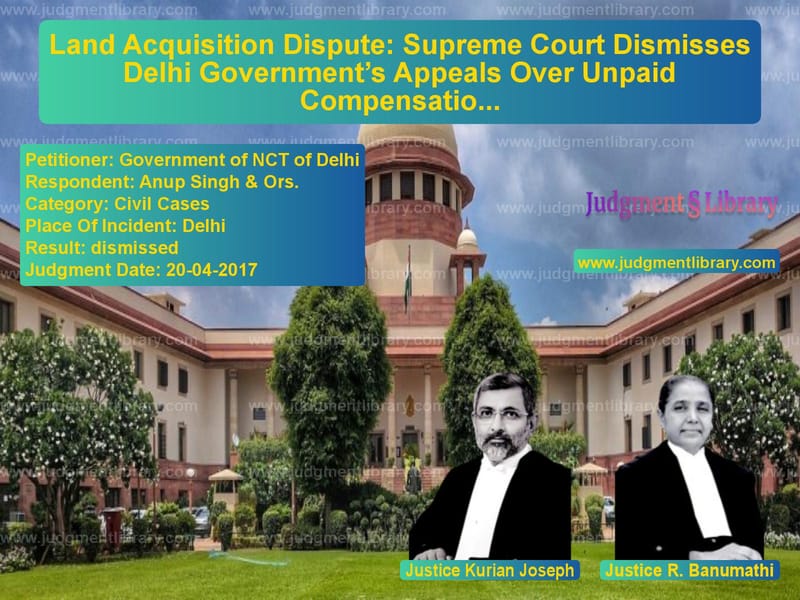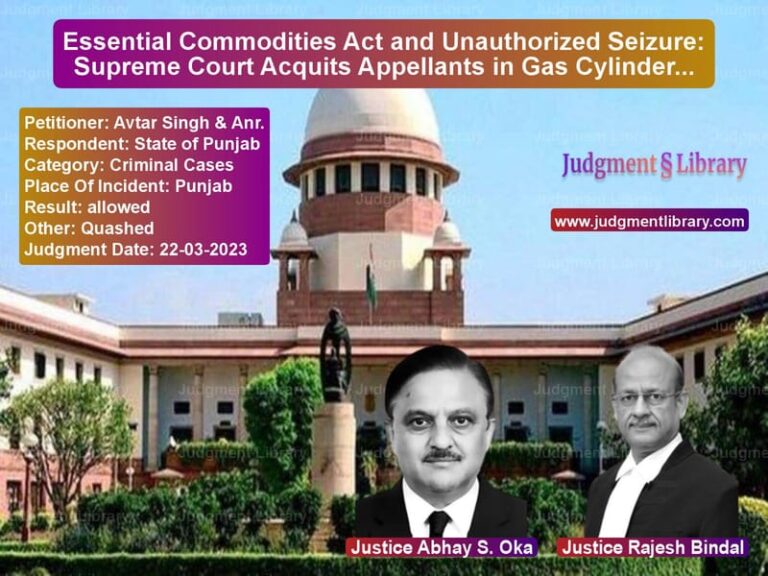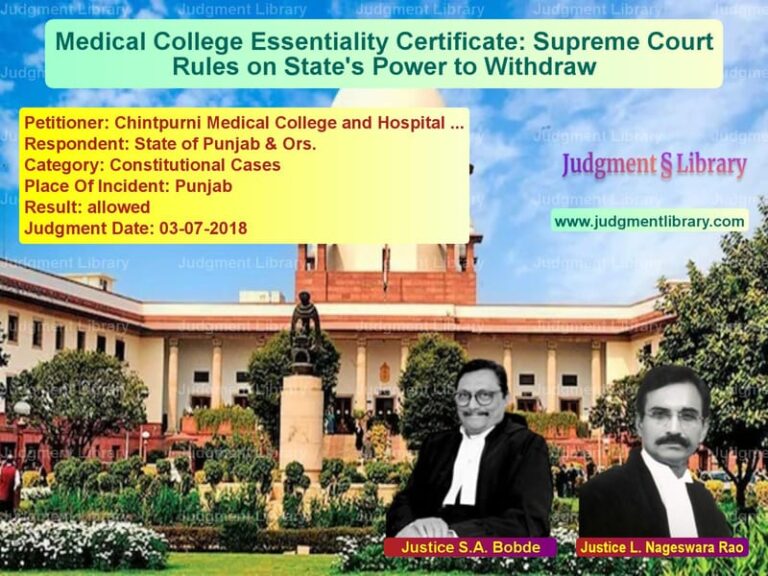Land Acquisition Dispute: Supreme Court Dismisses Delhi Government’s Appeals Over Unpaid Compensation
The Supreme Court of India delivered a decisive ruling in the case of Government of NCT of Delhi vs. Anup Singh & Ors., where landowners had not received compensation for acquired land. The Court dismissed the appeals filed by the Government of NCT of Delhi and reaffirmed the provisions of Section 24(2) of the Right to Fair Compensation and Transparency in Land Acquisition, Rehabilitation, and Resettlement Act, 2013. The judgment ensures that the rights of landowners are upheld and sets a precedent for future land acquisition cases.
The appeals were dismissed because the government neither took possession of the land nor compensated the owners within the statutory five-year period. The ruling highlights the accountability of government agencies in land acquisitions and emphasizes that delays in compensation cannot deprive landowners of their legal rights.
Background of the Case
The dispute arose from multiple land acquisitions carried out by the Government of NCT of Delhi through its Land and Building Department. Several landowners challenged the acquisition, arguing that the government failed to fulfill its obligations under the 2013 Act. Specifically:
- The government acquired land from the respondents (landowners), but no compensation was paid.
- The government failed to take possession of the land despite no legal restriction preventing it.
- The landowners invoked Section 24(2) of the 2013 Act, arguing that the acquisition should lapse due to non-compliance with the five-year rule.
Arguments by the Petitioner (Government of NCT of Delhi)
The government contended that:
- The land was acquired for public purposes, and administrative issues had caused delays in compensation and possession.
- The failure to take possession should not result in an automatic lapse of the acquisition.
- The landowners were still entitled to compensation, and the process should be allowed to continue.
Arguments by the Respondents (Landowners)
The respondents countered the government’s claims with the following arguments:
- No compensation had been paid despite the government acquiring the land.
- No legal stay order had prevented the government from taking possession.
- Under Section 24(2) of the 2013 Act, the acquisition must lapse if possession was not taken and compensation not paid within five years.
Supreme Court’s Observations
The Supreme Court, after reviewing the facts, noted that the case fell squarely within the provisions of the 2013 Act. The Court stated:
“These are the cases of the original owners where neither possession has been taken nor compensation has been paid to the respondents.”
The Court further highlighted that there was no legal impediment preventing the government from fulfilling its obligations:
“It is also brought to the notice of the court that there was no stay operating, which prevented the appellant(s) from taking possession or paying compensation to the respondents.”
Given that the statutory five-year period had lapsed, the Supreme Court ruled:
“Neither having been done within five years, as contemplated under Section 24(2) of The Right to Fair Compensation and Transparency in Land Acquisition, Rehabilitation and Resettlement Act, 2013, we find no merit in these appeals, which are, accordingly, dismissed.”
Final Judgment
The Supreme Court dismissed all the appeals filed by the Government of NCT of Delhi and directed that the landowners retain ownership of their lands. No costs were imposed on either party.
Legal Significance of the Judgment
This ruling reinforces key legal principles in land acquisition cases:
- The government must adhere to the statutory timeline for compensating landowners.
- If possession is not taken and compensation not paid within five years, the acquisition lapses under the Right to Fair Compensation and Transparency in Land Acquisition Act, 2013.
- The absence of a legal stay does not justify government inaction.
Impact on Future Cases
The Supreme Court’s ruling sets an important precedent:
- Landowners can challenge acquisitions where the government fails to comply with compensation provisions.
- Government agencies must ensure land acquisition processes are completed within the prescribed legal framework.
- Prolonged delays in compensation and possession will not be tolerated by the courts.
Conclusion
The case of Government of NCT of Delhi vs. Anup Singh & Ors. serves as a landmark ruling protecting landowners’ rights. By dismissing the appeals, the Supreme Court upheld the principle that government agencies cannot indefinitely delay compensation or possession. The judgment ensures fair treatment for landowners and emphasizes the need for strict adherence to land acquisition laws.
This ruling strengthens the legal framework surrounding land acquisitions in India and reinforces the judiciary’s role in safeguarding property rights.
Don’t miss out on the full details! Download the complete judgment in PDF format below and gain valuable insights instantly!
Download Judgment: Government of NCT of vs Anup Singh & Ors. Supreme Court of India Judgment Dated 20-04-2017.pdf
Direct Downlaod Judgment: Direct downlaod this Judgment
See all petitions in Property Disputes
See all petitions in Contract Disputes
See all petitions in Damages and Compensation
See all petitions in Judgment by Kurian Joseph
See all petitions in Judgment by R. Banumathi
See all petitions in dismissed
See all petitions in supreme court of India judgments April 2017
See all petitions in 2017 judgments
See all posts in Civil Cases Category
See all allowed petitions in Civil Cases Category
See all Dismissed petitions in Civil Cases Category
See all partially allowed petitions in Civil Cases Category







